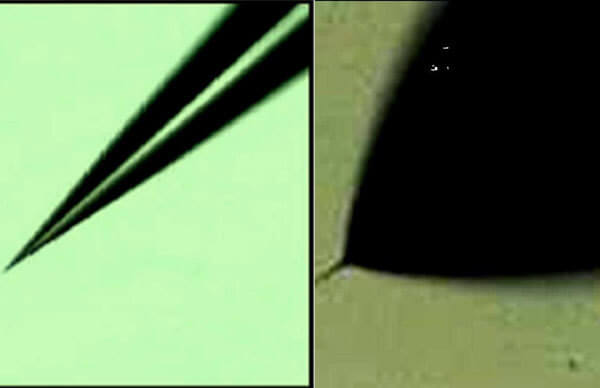AC Electrospray Ion Source for Mass Spectrometry
Tech ID: 10-030
Inventors: Dr. David Go, Dr. Nishant Chetwani, and Dr. Hsueh-Chia Chang
Date Added: August 12, 2019

Overview
A new ionization source for mass spectrometry that utilizes a high-frequency alternating current (AC) voltage to generate an electrospray and form gas-phase ions from liquid.
Technology Summary
Use of mass spectrometry is often limited by weaknesses associated with the ionization source, which either does not produce sufficient sample ions for detection, fragments the sample ions, or does not efficiently transfer the ions into the mass spectrometer. While alternate techniques such as DC electrospray ionization (DC ESI) and matrix-assisted laser desorption ionization have addressed some of these limitations, they are not without limitations of their own.
In response, researchers at the University of Notre Dame have developed a new ionization source that utilizes a high-frequency AC voltage to generate an electrospray and form gas-phase ions from liquid. This source coupled with mass spectrometry allows for the superior detection, identification, and quantification of chemical species in liquid samples. Unlike DC ESI, AC electrospray ionization (AC ESI) can preferentially entrain large molecules and thus can be used for both positive mode mass spectrometry (proteins, peptides, etc.) and negative mode mass spectrometry (oligonucleotides, fossil fuels, etc.). The primary advantage of AC ESI is that it generates higher resolution mass spectrometry signals.
Market Advantages
- Multiple charged states
- Preconcentrated analyte ions in liquid cone improve the signal intensity by at least an order of magnitude
- Better signal to noise ratio
- Lower limit of detection
Technology Readiness Status
TRL 4 - Lab Validation
Intellectual Property
US Patent No. 8,716,675
(Methods and apparatus for mass spectrometry utilizing an AC electrospray device)
Publication
High-frequency AC electrospray ionization source for mass spectrometry of biomolecules
doi: 10.1016/j.jasms.2010.06.023
Contact
Richard Cox
574.631.5158